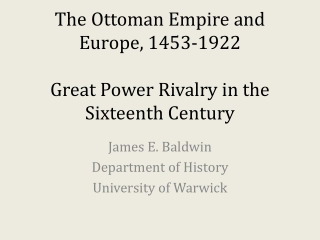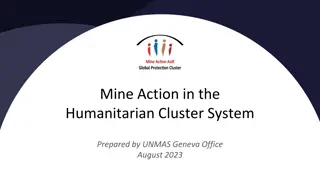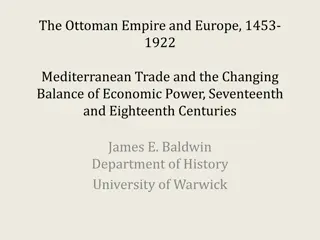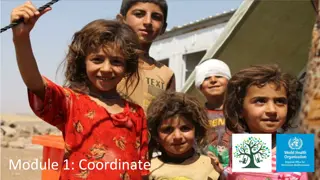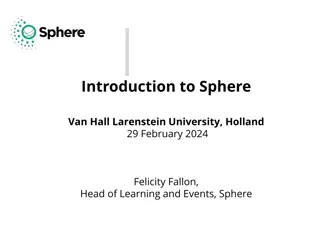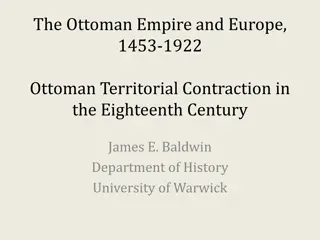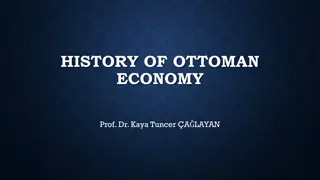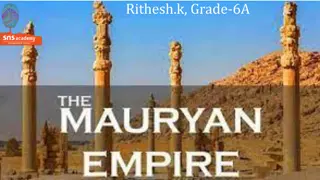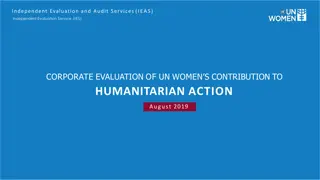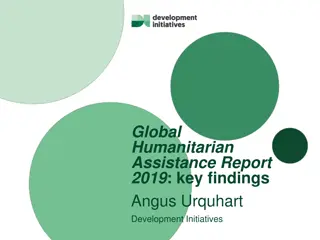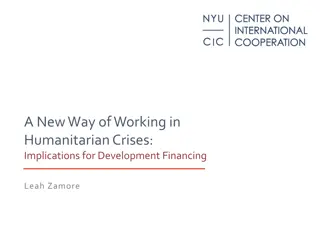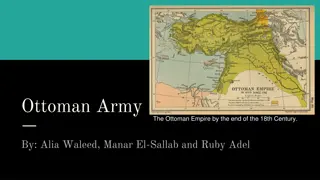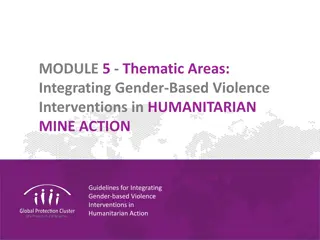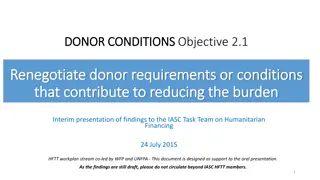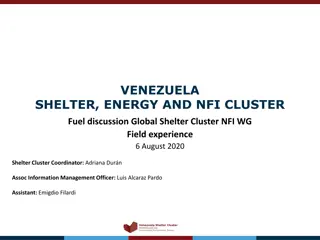European Humanitarian Intervention in the Ottoman Empire
Explore European powers' moral duty to intervene in Ottoman affairs during the 19th century, motivated by humanitarian and imperial interests. Discover the impact of the Concert of Europe and legal theories on humanitarian intervention.
Download Presentation

Please find below an Image/Link to download the presentation.
The content on the website is provided AS IS for your information and personal use only. It may not be sold, licensed, or shared on other websites without obtaining consent from the author. Download presentation by click this link. If you encounter any issues during the download, it is possible that the publisher has removed the file from their server.
E N D
Presentation Transcript
The Ottoman Empire and Europe, 1453-1922 European Intervention in the Ottoman Empire: Lebanon and Bulgaria James E. Baldwin Department of History University of Warwick
Humanitarian intervention in the Ottoman Empire 19th-century Ottoman Empire saw much violence due to nationalist uprisings and emergence of sectarianism European powers claimed a moral duty to intervene when Christians suffered violence Humanitarian intervention was also a means for European powers to extend their influence over Ottoman territory; particularly important as colonial conquest was forbidden by European agreement Humanitarian and imperial motives were inextricably interlinked
The Concert of Europe Formed in 1815 after Napoleonic Wars, consisted of Britain, France, Prussia, Austria and Russia. Loose arrangement that agreed basic principles for international diplomacy; little formal institutional structure
The Concert of Europe Formed in 1815 after Napoleonic Wars, consisted of Britain, France, Prussia, Austria and Russia. Loose arrangement that agreed basic principles for international diplomacy; little formal institutional structure
Rules of the Concert of Europe Only the five great powers should decide great European questions No power should wage for for territorial gain within Europe, nor foment unrest in another European state No international question of vital interest to a great power should be raised without its consent No power should refuse an international conference to resolve a question, nor should any power be excluded Direct confrontations between the great powers should be avoided by referring disputes to the Concert Decisions should be unanimous
Legal theory of humanitarian intervention Humanitarian intervention in tension with sovereignty Non-intervention in the affairs of another state was the rule within Europe Legal scholars drew a distinction between civilized and uncivilized states; only the former were held to have sovereignty The Ottoman Empire typically categorized as uncivilized, on the basis of despotism, Islam, polygamy, slavery, lack of aristocracy, mistreatment of Christians As they lacked sovereignty, intervention in uncivilized states was in principle permissible, but must be justified by a humanitarian crisis
Lebanon in 1860 Mount Lebanon: the mountainous interior between Beirut and Damascus Heterogeneous population: biggest communities Maronites (uniate Christians) and Druze (offshoot of Shiite Islam) Dominated by wealthy Maronite and Druze landowning clans; relatively autonomous from Ottoman control Before to mid-19thcentury, Lebanese politics revolved around clan and village rather than sectarian identity
Lebanon in 1860 Mount Lebanon: the mountainous interior between Beirut and Damascus Heterogeneous population: biggest communities Maronites (uniate Christians) and Druze (offshoot of Shiite Islam) Dominated by wealthy Maronite and Druze landowning clans; relatively autonomous from Ottoman control Before to mid-19thcentury, Lebanese politics revolved around clan and village rather than sectarian identity
Factors leading to sectarian tension in Lebanon and Syria From 1831-40, region occupied by Egyptian military; Egyptian occupation used divide- and-rule tactics and encouraged European immigration and investment Restoration of Ottoman rule, with European control, divided Mount Lebanon into Maronite-controlled north and Druze- controlled south, introducing the sectarian principle into Lebanese politics
Factors leading to sectarian tension in Lebanon and Syria Ottoman Land Code of 1858: allowed Europeans and their proteges to own land, which they often bought from cash-poor Muslim landlords Tanzimat s grant of formal equality to Muslims and non-Muslims, in combination with rising wealth of Christians, caused Muslim resentment at loss of privilege Peasant revolt led by Maronite Tanyus Shahin in 1858: initially targeted landlords regardless of religion, but as revolt took hold in the Druze- dominated south, it took on a sectarian dimension
Sectarian violence of 1860 Waves of sectarian violence swept Mount Lebanon in May 1860: villages burned, Maronites and Druzes killed, monasteries besieged and destroyed On July 9-11, violence spread to Damascus when Druze militias attacked the Christian quarter Thousands of Christians, including some Europeans, killed in Damascus Ottoman authorities did not support violence but were overwhelmed and failed initially to control it Ottoman government sent a military detachment led by Fuad Pasha; he landed in Beirut on July 17 and managed to restore order
European response Britain and France agreed on the need to protect Christians, but wary of each other s motives Conference convened in Paris European military force, led by France, sent for six- month mission to pacify Syria European navies patrolled Syrian coast Despite French desire to undertake a more aggressive action against the Druze, the European force ended up playing a largely humanitarian role: reconstructing the country and supporting refugees
Political intervention Conference in Constantinople agreed a new administrative structure for Lebanon in document called the Reglement et protocole relatifs a la Reorganisation du Mont Liban Governor of Lebanon to be a non-Maronite Christian from outside Lebanon Elected Administrative Council had fixed numbers of Christian, Muslim and Druze representatives Limited police force (7 police per 1000 people) under governor s control had right to disarm population Reglement successful in preserving stability in Lebanon; however further entrenched the sectarian principle in Lebanese politics
Bulgarian Atrocities of 1876 Minor insurgency by Bulgarian nationalists met with violent overreaction by the Ottomans Ottoman irregular forces massacred Christians in the region of Plovdiv Massacres received sensational and partisan press coverage in Europe
European debates over intervention Conservative government in Britain not inclined to intervene due to alliance with Ottomans and fear of Russian expansion Sought to manage public opinion by censoring official reports and presenting massacres as part of communal conflict that was outside the Ottoman government s control Liberal opposition led by Gladstone saw opportunity to harass Disraeli and presented the moral case for humanitarian intervention
European debates over intervention Conference failed to achieve agreement on intervention due to mistrust between Britain and Russia In the absence of agreed international intervention, Russia declared war on the Ottoman Empire in 1877 and won swiftly Treaty of San Stefano awarded large independent state to Bulgarians
Post-war European political intervention Other European powers determined to limit Russia s gains from war: feared that independent Bulgaria would be a vehicle for Russian influence Treaty of Berlin overturned Treaty of San Stefano, dramatically reducing size of autonomous Bulgarian state Treaty of Berlin imposes conditions on Ottoman rule in Eastern Rumelia province


